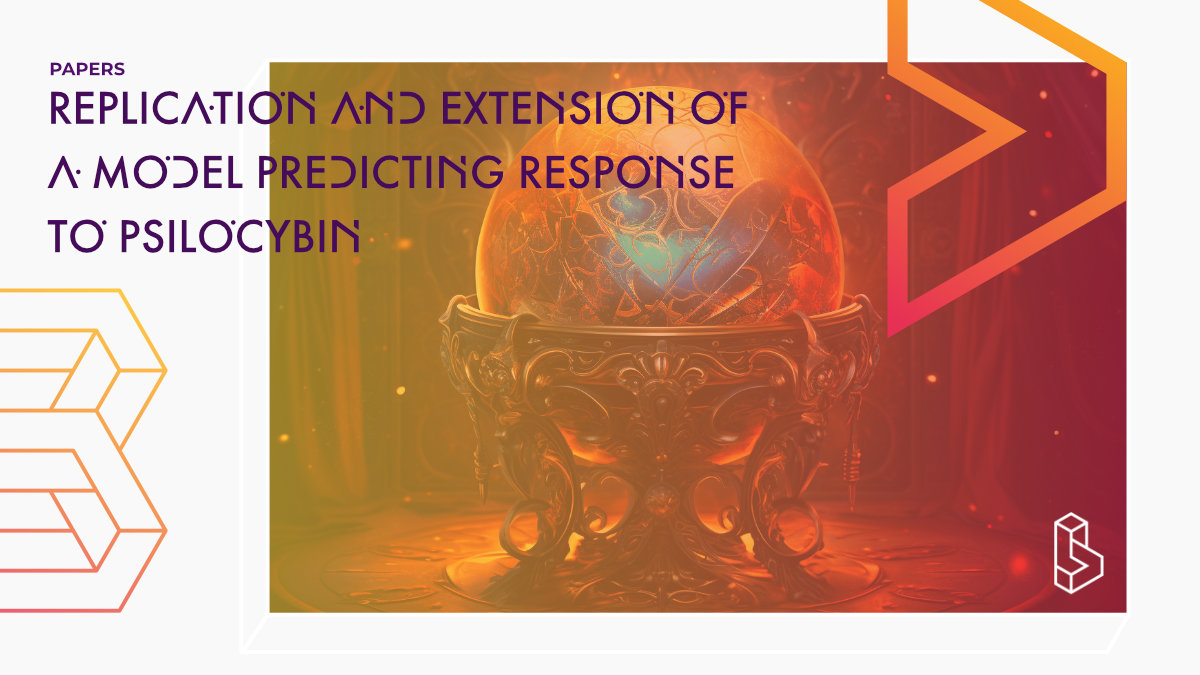This retrospective study (n=183) replicated an earlier model of psilocybin response, which predicts that states of surrender and preoccupation at the time of ingestion are significant variables determining the nature of the experience.
Abstract of Replication and extension of a model predicting response to psilocybin
“Background: Recent research demonstrated the potential of psychedelic drugs as treatment for depression and death-related anxiety and as an enhancement for well-being. While generally positive, responses to psychedelic drugs can vary according to traits, setting, and mental state (set) before and during ingestion. Most earlier models explain minimal response variation, primarily related to dosage and trust, but a recent study found that states of surrender and preoccupation at the time of ingestion explained substantial variance in mystical and adverse psilocybin experiences.
Objectives: The current study sought to replicate the previous model, extend the model with additional predictors, and examine the role of mystical experience on positive change.
Method: A hierarchical regression model was created with crowdsourced retrospective data from 183 individuals who had self-administered psilocybin in the past year. Scales explored mental states before, during, and after psilocybin ingestion, relying on open-ended memory prompts at each juncture to trigger recollections. Controlled drug administration was not employed.
Results: This study replicated the previous model, finding a state of surrender before ingestion a key predictor of optimal experience and preoccupation a key predictor of adverse experience. Additional predictors added to the explanatory power for optimal and adverse experience. The model supported the importance of mystical experiences to long-term change.
Conclusion: Mental states of surrender or preoccupation at the time of ingestion explain variance in mystical or adverse psilocybin experiences, and mystical experiences relate to long-term positive change. The capacity to recognize this optimal preparatory mental state may benefit therapeutic use of psilocybin in clinical settings.”
Authors: Suzanne L. Russ, Robin L. Carhart-Harris, Geoffrey Maruyama & M. S. Elliott
Summary of Replication and extension of a model predicting response to psilocybin
Recent research demonstrated that psychedelic drugs can be used to treat depression and death-related anxiety and enhance well-being. However, responses to psychedelic drugs can vary according to traits, setting, and mental state before and during ingestion.
Replication and extension of a model predicting response to psilocybin
Studies have shown positive response for patients with depression, anxiety related to dying, tobacco addiction, and obsessive-compulsive disorder, as well as increased optimism, openness, and personal meaning for healthy individuals. However, responses to psychedelic drugs are not entirely predictable.
Find this paper
Replication and extension of a model predicting response to psilocybin
https://doi.org/10.1007/s00213-019-05279-z
Paywall | Google Scholar | Backup | 🕊
Cite this paper (APA)
Russ, S. L., Carhart-Harris, R. L., Maruyama, G., & Elliott, M. S. (2019). Replication and extension of a model predicting response to psilocybin. Psychopharmacology, 236, 3221-3230.
Study details
Compounds studied
Psilocybin
Topics studied
Neuroscience
Study characteristics
Theory Building
Participants
183
Humans
Authors
Authors associated with this publication with profiles on Blossom
Robin Carhart-HarrisDr. Robin Carhart-Harris is the Founding Director of the Neuroscape Psychedelics Division at UCSF. Previously he led the Psychedelic group at Imperial College London.

